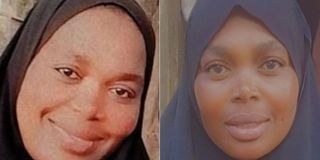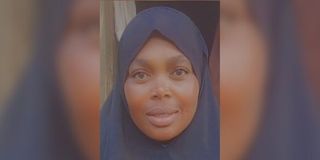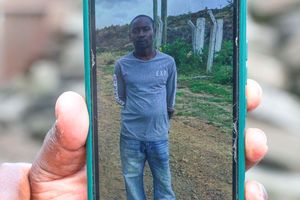
Najma Athman Bwanamusa who was shot dead by her former husband Shafi Swaleh Bwana.
For Najma Athman Bwanamusa, settling in Kenya after fleeing the war-torn Somalia was a long-awaited relief.
Najma arrived in Kenya in 2011 and along other refugees settled in Kiunga, a small town on the Kenya-Somalia border in Lamu County.
After years of hardship, Kiunga offered her the peace she could never find back home allowing her to rebuild her life, find love and raise a family.
But on Monday, that life was cut short when her ex-husband Shafi Swaleh Bwana, a National Police Reservist (NPR), shot her dead before turning the gun on himself.
Also injured in the incident was Najma’s friend Mariam Alal Yusuf, a fellow Somali refugee, who sustained gunshot wounds to the shoulder.

Najma Athman Bwanamusa who was shot dead by her former husband Shafi Swaleh Bwana.
Najma, 34, had lived in Kiunga for over a decade. Her time in Kenya, her refugee status and her eventual marriage to Shafi, a 36-year-old Swahili Bajuni native of Kiunga, earned her resident alien status according to government records and officials.
“Najma was a resident alien who grew up with us here in Kiunga. Along with her mother and siblings, she crossed into Kenya from Somalia due to insecurity in their country. She married Shafi in 2019 and they were blessed with one child,” said a government official, who spoke on condition of anonymity as he is not authorised to speak to the press.
Locals say the couple had once lived harmoniously and were regularly seen together. Two years ago, their daughter was born.
Troubled marriage
However, their relationship began to unravel recently plagued by disputes and suspicions that escalated over time. When Najma became pregnant with their second child, the disagreements intensified, eventually leading to their separation.
Last Sunday, in line with Islamic tradition, Shafi pronounced the third and final “Tuhr”, formalising their divorce.
Less than 24 hours later, he returned to Najma’s home and fatally shot her. He also shot Mariam whom he accused of aiding Najma’s alleged infidelity.
Shafi then turned the gun on himself.
“He was known as a peace-loving and disciplined man. That is why why we trusted him with the NPR role. It’s unfortunate he committed such an act,” said the official.
A police report indicated that the shooting was triggered by infidelity accusations. According to the report, the couple had separated just four days earlier after Shafi accused Najma of having an affair. The report said Mariam, her friend, was also suspected of facilitating the alleged relationship.
Mariam was initially taken to King Fahd County Referral Hospital in Lamu before being referred to Mombasa for specialised treatment and remains in critical condition.
Following the tragic murder-suicide, humanitarian agencies and local authorities in Lamu have renewed calls for the protection and support of refugees particularly around mental health, gender-based violence and legal awareness.
Lamu County Peacebuilding and Refugee Welfare Officer Shee Kupi said the tragedy underscores the urgent need for mental health services and deeper integration efforts between host communities and refugees. He noted that about 505 refugees currently reside in Kiunga.
Cases of abuse or threats
Mr Kupi’s team has since mobilised on the ground offering psychosocial support to the affected families and community and raising awareness about refugee rights, abuse reporting and documentation issues.
“This tragedy highlights the urgent need for mental health support and stronger integration programs. We had to step in not just as humanitarian champions, but as a voice for the voiceless,” he said.
He also revealed that Mariam faced delays in accessing urgent medical care due to documentation problems. Her alien ID card had expired, denying her access to the Social Health Authority (SHA) medical insurance, which is essential for treatment in public hospitals.
“I had to personally intervene to ensure she received care. I thank the Lamu County Government for facilitating her referral and the Mombasa refugee department for assisting with renewing her documentation,” he added.
The officer also announced plans to roll out a public awareness campaign targeting refugee communities in Lamu. The initiative will educate refugees about their rights, the importance of valid documentation, and where to seek help in cases of abuse or threats.
“My mission is to ensure every refugee in our region is safe, heard, and treated with dignity. What happened in Kiunga should never happen again. We all have a role to play in building a more inclusive and peaceful society,” he said.
Lamu East Deputy County Commissioner George Kubai while confirming the incident on Monday, urged members of the public to seek professional counseling services when dealing with difficult personal or relationship challenges.
“It is very sad. A child has now been orphaned and will grow up without both parents. We must find better ways to deal with our problems because violence is never the answer,” Mr Kubai said.








